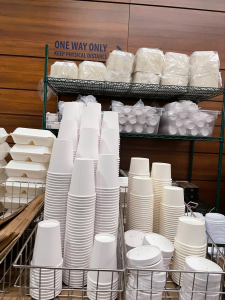By: Julia Marquis, current first year at Emory pursuing a BS in environmental science
During my transition to Emory’s campus this fall as a first-year student, I have been trying to explore each of the food options on campus and give them my own personal review. Now, these “reviews” are based on many things, but one specific aspect that I have been focusing on is how much waste a certain meal produces. I have become increasingly more conscious about how much waste I generate, both in trash, food, and even noise. Upon coming to college, finding my own food on campus has sometimes presented a food waste challenge. Entering the dining hall, my eyes take over my stomach, and I find myself filling my plate with more food than I can finish, and then feeling guilty for wasting it. On the other hand, grabbing a quick lunch at Eagle Emporium or a to-go meal means using single-use plastic. It seems to be a lose-lose situation. So, my main question is, how can we as individuals play our part to reduce food waste every day?
I am a firm believer that waste reduction is the solution to a lot of large-scale sustainability issues. While most of this waste reduction needs to take place within larger corporations and government systems, for the purpose of this article, we are going to focus on individual and community efforts. Emory has made their efforts to provide sustainable food noticeably clear. We have access to the Emory Farmers Market, the takeout boxes at the dining hall are compostable, and there are accessible recycling and compost bins around campus. Despite these efforts, we still produce a lot of waste because we are an institution with thousands of students, faculty, and staff, which is to be expected. With individual education and small individual change, however, we can begin to make strides towards less overall waste.
So, what is the action plan? How do we even begin to make small choices to reduce our food waste? Well,  maybe it starts at the dining hall. It can be hard to control portions because most of the stations are not self-serve. Choosing options that are self-service or asking serving staff for a smaller portion and then going back for more if you are still hungry helps combat the eyes overpowering the stomach issue. Additionally, if taking a meal to-go, you can try and use your own tupperware or carry a set of reusable utensils. There are lots of alternatives outside of the realm of food waste that begin with individual conscious thinking. A big part of reducing your own food waste comes from knowing your own body and how much food you need to feel satisfied and healthy. So next time you head to grab a meal, stop and think about how much waste is being left behind, and what choices you can do to eliminate food waste in the future.
maybe it starts at the dining hall. It can be hard to control portions because most of the stations are not self-serve. Choosing options that are self-service or asking serving staff for a smaller portion and then going back for more if you are still hungry helps combat the eyes overpowering the stomach issue. Additionally, if taking a meal to-go, you can try and use your own tupperware or carry a set of reusable utensils. There are lots of alternatives outside of the realm of food waste that begin with individual conscious thinking. A big part of reducing your own food waste comes from knowing your own body and how much food you need to feel satisfied and healthy. So next time you head to grab a meal, stop and think about how much waste is being left behind, and what choices you can do to eliminate food waste in the future.
